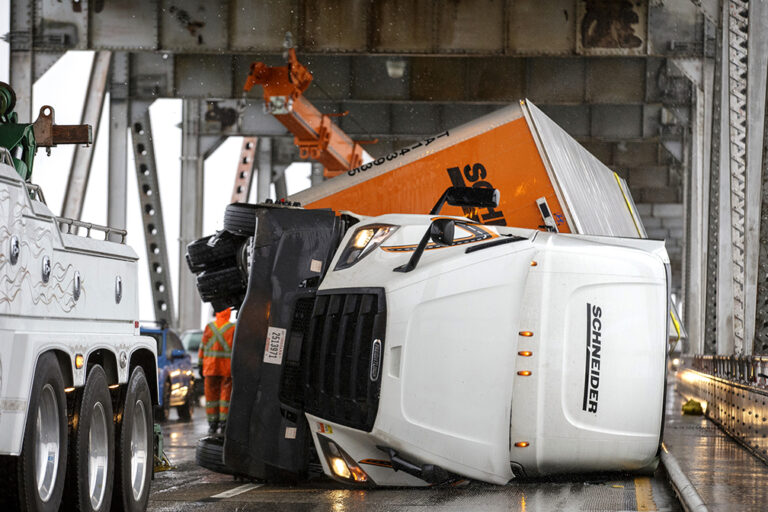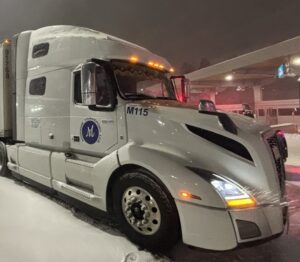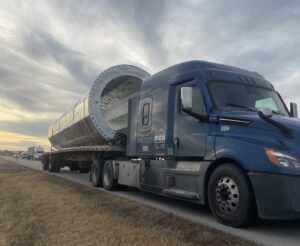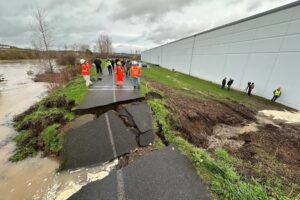SAN FRANCISCO — A massive storm barreled toward Southern California on Monday, Oct. 25, after flooding highways, toppling trees, cutting power to about 380,000 utility customers and causing rock slides and mud flows in areas burned bare by wildfires across the northern half of the state.
Drenching rains and strong winds accompanied the weekend arrival of an atmospheric river — a long plume of Pacific moisture — into the drought-stricken state.
Rainfall records were shattered and heavy snow pounded high elevations of the Sierra Nevada. The National Weather Service issued numerous flash flood warnings.
There were widespread power outages in Northern California, with Pacific Gas & Electric reporting Sunday evening that about 130,000 customers did not have electricity, though the utility said power had been restored to about 250,000 customers.
Flooding was reported across the San Francisco Bay Area, closing streets in Berkeley, inundating Oakland’s Bay Bridge toll plaza and overflowing rivers in Napa and Sonoma counties.
“It’s been a memorable past 24 hours for the Bay Area as the long talked-about atmospheric river rolled through the region,” the local weather office said. “We literally have gone from fire/drought conditions to flooding in one storm cycle.”
The weather service called preliminary rainfall totals “staggering,” including 11 inches at the base of Marin County’s Mount Tamalpais and 4.02 inches in downtown San Francisco.
“It looks like yesterday was the fourth wettest day ever for downtown SF where records go back to the Gold Rush years,” the weather service said.
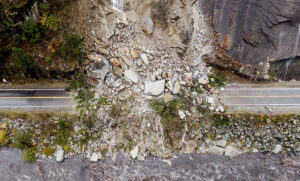
About 150 miles to the north, the California Highway Patrol closed a stretch of State Route 70 in Butte and Plumas counties because of multiple landslides within the massive Dixie Fire burn scar.
In the state’s Central Valley, Sacramento got 5.4 inches of rain, smashing the all-time one-day rainfall record dating to 1880, the weather service said. Interstate 80, the major highway through the Sierra to Reno, Nevada, was shut down by heavy snow early Monday.
The same storm system also slammed Oregon and Washington state, causing power outages that affected tens of thousands of people. Two people were killed when a tree fell on a vehicle in the greater Seattle area.
In California’s Colusa and Yolo counties, state highways 16 and 20 were shut for several miles because of mudslides, the state Department of Transportation said.
Burn areas remain a concern because land devoid of vegetation can’t soak up heavy rainfall as quickly, increasing the likelihood of flash flooding.
“If you are in the vicinity of a recent burn scar and haven’t already, prepare now for likely debris flows,” the Sacramento weather service tweeted. “If you are told to evacuate by local officials, or you feel threatened, do not hesitate to do so. If it is too late to evacuate, get to higher ground.”
South of San Francisco, evacuation orders were in effect in the Santa Cruz Mountains over concerns that several inches of rain could trigger debris flows in the CZU Lightning Complex Fire burn scar when the storm moves through early Monday.
Further south, evacuation warnings for parts of western Santa Barbara County were upgraded to evacuation orders in the area burned by this month’s Alisal Fire.
Officials said mountain areas above 9,000 feet in the Sierra Nevada could get 18 inches of snow or more from Sunday until Monday morning.
Recent storms have helped contain some of the nation’s largest wildfires this year. But it remains to be seen if the wet weather will make a dent in the drought that’s plaguing California and the western United States.
California’s climate is hotter and drier now and that means the rain and snow that does fall is more likely to evaporate and less likely to absorb into the soil.
California’s 2021 water year, which ended Sept. 30, was the second driest on record and last year’s was the fifth driest on record. Some of the state’s most important reservoirs are at record low levels.
The Associated Press is an independent global news organization dedicated to factual reporting. Founded in 1846, AP today remains the most trusted source of fast, accurate, unbiased news in all formats and the essential provider of the technology and services vital to the news business. The Trucker Media Group is subscriber of The Associated Press has been granted the license to use this content on TheTrucker.com and The Trucker newspaper in accordance with its Content License Agreement with The Associated Press.








